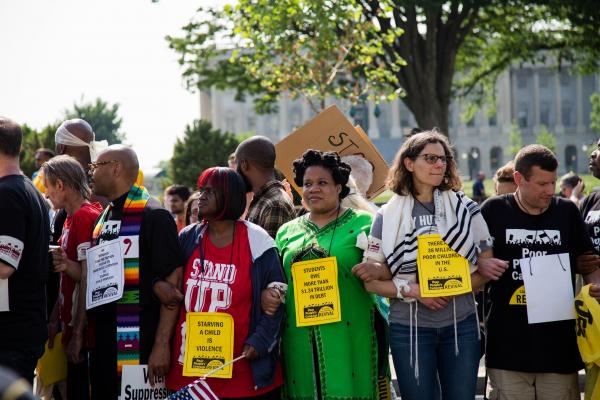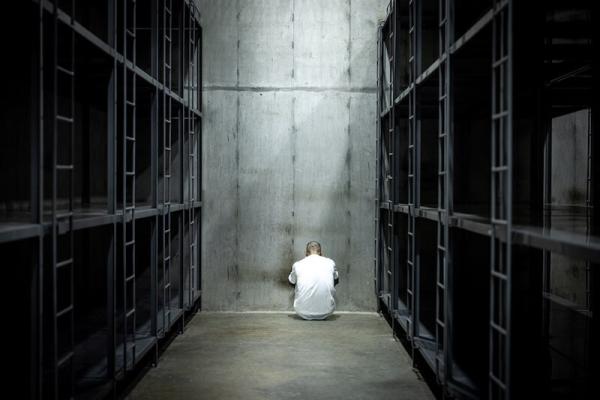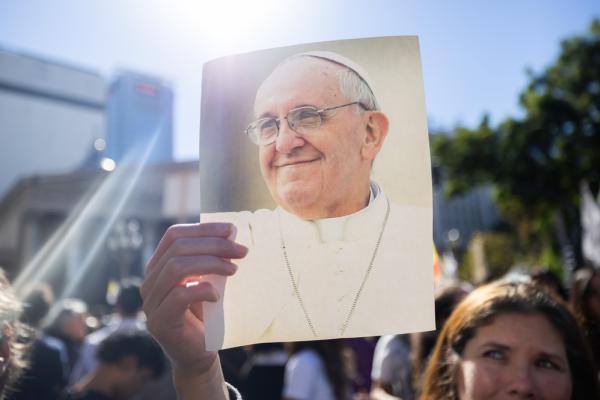Last week, the Poor People’s Campaign: A National Call for Moral Revival kicked off with eight weeks of nonviolent direct action every Monday. Movements have long recognized the deep work necessary to build community, and that is why after the mass arrests on Monday, the campaign hosts #TruthfulTuesdays, a series of teach-ins for social justice. As the Rev. Dr. Liz Theoharis said at the first one, “Yesterday we were loud. But we can’t be loud and wrong.”
These teach-ins are not lectures, where a solemn expert with a Ph.D. will pass on information only they can access. While the Poor People’s Campaign is led by two co-chairs with Ph.D.s, the teach-ins are an opportunity to hear from panels of practitioners who are doing the work. After the panelists speak, the rest of those gathered are invited to offer their own thoughts and stories.
This model of community learning builds power through giving people the opportunity to form friendships, discuss important issues, and — hopefully — form a consensus around what to do going forward. Because the goal is radically different from that of a college lecture, the format shifts from individual to communal, from observational to participatory. Solidarity isn’t built by paying a charismatic leader to show up and give orders.
During the civil rights movement, Ella Baker created communities of people like the Student Nonviolent Coordinating Committee where hierarchies were flattened and people built their organizations on the firm foundation of communal conversations. Without Baker’s organizing, there would not have been a movement for King to lead.
Baker knew whenever there is a hierarchy, the privileged are more likely to make it to the top. If a group’s needs manage finances and plot strategy, and there are a limited number of spots at the top, those more wealthy and educated would have an unfair advantage in the competition for those positions. Thus, a movement on behalf of the poor and marginalized would inevitably perpetuate the very hierarchies it professed to end.
Contemporary movements like Black Lives Matter operate off Baker’s model, proudly declaring themselves to be not leaderless, but leaderful. This model embraces the worth and gift of all those who wish to participate, and highlights in particular the calling of those they want to empower. Movements must embody the world they hope to build, as a matter of moral integrity and as a visual representation to those they hope to recruit to their cause.
Today, these movements invite people out of a digital world and into embodied practice of community. While activism requires getting the word out through any medium, usually the digital world of Twitter and Facebook, #TruthfulTuesdays require that people show up and talk to each other face to face. There are awkward pauses. Some are hesitant to speak up. But these are markers of real relationship, created by a space where status isn’t dependent on social media postings.
Our digital world is increasingly disembodied. People are valued for their minds, for what they can tweet, observe, say, or spot from a distance.
Christians know the power of embodied practice to change the world. Many believe one becomes a Christian if they believe the gospel, a formula in which one comes to see themselves as sinful and in need of redemption, a redemption guaranteed through belief in the sacrifice of Jesus. This gospel formula is true, but formulas do not make a Christian. Theologians from the fourth century bishop Augustine onward have reminded us that you can’t become a Christian without becoming a member of the church through Baptism. Being a Christian requires that you have a body, and that you be physically immersed into the sin, suffering, and death of Jesus and be raised from those waters with Christ.
The primary ask of the Poor People’s Campaign is that people engage in nonviolent direct action. It is not enough to post, engage, observe, or encourage from a distance. You cannot be part of the movement by commenting, or listening to a live stream. You have to show up. You have to place your body on the line.
Got something to say about what you're reading? We value your feedback!







